Comedy is no doubt as old as humanity. Perhaps older! Perhaps Australopithecus snickered at the occasional rude gesture, comedic expression, or the sight of a saber-toothed tiger slipping on the ancient equivalent of a banana peel. Unsurprisingly, comedy has worked its way into science fiction and fantasy: Consider these five comedic works, each of which will likely bring a smile to one’s face.
The Night Life of the Gods by Thorne Smith (1931)
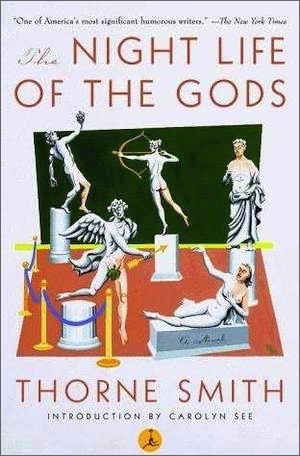
At first glance, Hunter Hawk seems to have been served the same dismal gruel as any other Thorne Smith protagonist. His home is inhabited by a swarm of grasping relatives, each one more feckless than the last. Other Smith protagonists require some external impetus to jar them out their conventional rut. Not Hunter Hawk, for long before the reader meets him, Hawk has energetically embraced mad science.
Having invented a petrification ray, Hawk’s immediate impulse is to turn it on his disappointing relatives. This leaves the inventor free for a meet-cute with Megaera, a 900-year-old fairy. It happens that Megaera has a trick that mirrors Hawk’s: she knows how to turn stone to living flesh. The couple could use this to de-petrify his relations. Instead, they transform statues of Roman gods into living deities.
The gods demand entertainment. Fortuitously, Jazz Age America is more than able to provide it.
Options by Robert Sheckley (1975)
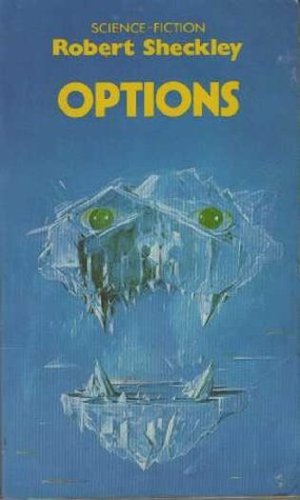
Forced by equipment failure to set his spaceship down on an alien world, Tom Mishkin is not worried. He is the scion of an experienced space-faring civilization, which has taken the precaution of scattering caches of emergency supplies on likely planets. This particular planet is not suited for human life, so Mishkin will have to rely on his Special Purpose Environmental Response robot. The robot will protect him on his way to the cache and help him repair his space ship. At least, that’s the plan…
Unfortunately the robot is programmed to deal with conditions on Darbis IV. Mishkin and his robot are on the planet Harmonium. The robot is worse than useless. Further setbacks ensue. Mishkin finds himself in dire straits. Will direct authorial intervention save the day?
This absurdist adventure could have been an utter downer of a book, but it isn’t (as one might expect from an author known for his sense of humor).
“The Ghost Who Vanished by Degrees” by Robertson Davies (1982)
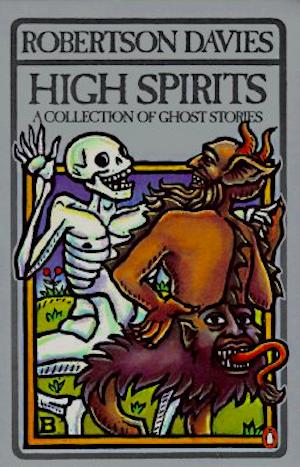
Robertson Davies is not entirely startled to be confronted by a ghost. That Massey College is haunted is no secret, and Davies is Master of Massey College. Indeed, Davies has seen the ghost in the past. However, being acknowledged and spoken to by the ghost is a new experience. As is being asked for help by the ghost.
Thirty years earlier, the ghost was a living graduate student. Having comprehensively failed his final examination, the despairing student killed himself. Ever since, he has haunted the college. His only hope of rest? Convincing Davies to revisit the shade’s examination so that the ghost can ascend to wherever ghosts go, newly conferred Ph.D. in hand.
There is the small catch, in that the ghost’s memories have faded somewhat since his death and he no longer remembers in which field his studies were focused. No worries! The ghost knows how to address that issue…
Archer’s Goon by Diana Wynne Jones (1984)
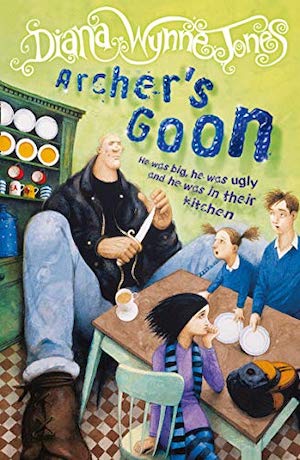
Young Howard Sykes returns home to discover that in Howard’s absence, a very large stranger has settled into the Sykes’ household. Howard’s father Quentin owes a mysterious Archer two thousand somethings. Archer has sent a goon to enforce payment. The goon won’t leave until Quentin hands over the somethings.
Wait. What? Somethings? Howard learns that his dad owes two thousand words, not two thousand pounds. This arrangement is a long-standing one, intended to jolt Quentin out of a nasty case of writer’s block. However, the arrangement was with one Mountjoy, not any one named Archer; no goons were involved. So what’s going on?
It turns out that the town in which the Sykes family resides is also the residence of seven powerful, irritable wizards. Wizards believe that Quentin is responsible for the fact that they cannot leave the town. They sent the goon; they won’t give up until Quentin and Howard lift the block; they might be angry enough to kill.
This one may not sound amusing either, based on the premise… but, believe me, it is!
Louisa the Poisoner by Tanith Lee (1995)
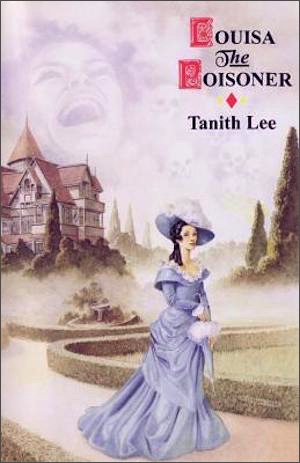
Pity poor Louisa, raised in a forbidding swamp by a mad aunt. When her deranged relative expires (of poison administered by Louisa), Louisa is left a penniless orphan. She has only one dubious asset: she has been schooled in the manners and customs of the well-born. Louisa’s charming ways win the young woman a place in the home of kindly Lord Maskullance.
This isn’t a romantic alliance. The lord feels a paternal fondness for the young Louisa. He takes this so far as to write a will that leaves her a share of his wealth. Not all of it; it is to be shared with a few other relatives. Louisa realizes that if those relatives were to die, her share would be larger.
Louisa is a determined young woman with healthy work ethic and an ample supply of poison….
***
No doubt you have your own comedic favourites, some of which might even be from the 21st century! Comments are, as ever, below.
In the words of Wikipedia editor TexasAndroid, prolific book reviewer and perennial Darwin Award nominee James Davis Nicoll is of “questionable notability.” His work has appeared in Publishers Weekly and Romantic Times as well as on his own websites, James Nicoll Reviews and the 2022 Aurora Award finalist Young People Read Old SFF (where he is assisted by editor Karen Lofstrom and web person Adrienne L. Travis). He is a four-time finalist for the Best Fan Writer Hugo Award, is eligible to be nominated again this year, and is surprisingly flammable.










